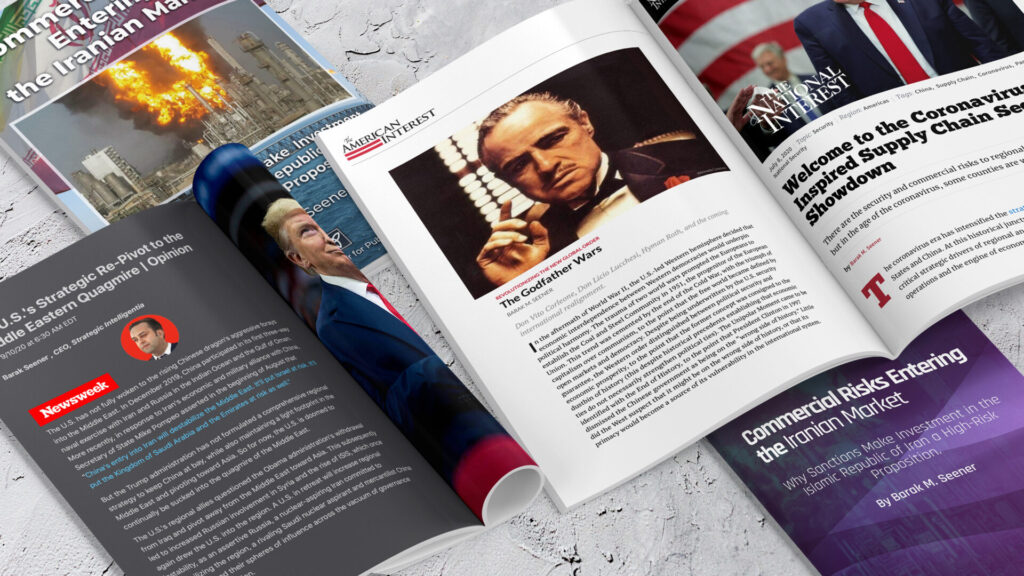Revolutionizing the New Global Order
The Godfather Wars
Barak Seener – Strategic Intelligentia
In the aftermath of World War II, the U.S.-led Western hemisphere decided that economic interdependence between Western democracies would underpin political harmony. The trauma of two world wars prompted the Europeans to establish the Coal and Steel Community in 1951, the progenitor of the European Union. This trend was cemented by the end of the Cold War, with the triumph of capitalism over communism, to the point that the free world became defined by open markets and democracy. Despite being underwritten by the U.S. security guarantee, the Western order distinguished between political security and economic prosperity, to the point that the former concept was consigned to the dustbin of history (this despite historical precedents establishing that economic ties do not necessarily strengthen political ties). The Unipolar Moment came to be identified with the End of History, to the point that President Clinton in 1997 dismissed the Chinese government as being on the “wrong side of history.” Little did the West suspect that it might be on the wrong side of history, or that its primacy would become a source of its vulnerability in the international system.
Liberal internationalists certainly did not anticipate China’s military assertiveness, or its economic decoupling with the United States. They embodied a tendency to idealistically project the West’s unique historical circumstances, and especially the triumph of democratic capitalism over Soviet communism, onto China’s totalitarian political system. This tendency was complemented by the West’s eagerness to access China’s large consumer market and natural resources. In the process, the West discarded realpolitik, and the bell rang forth, extolling the virtues of U.S.-Chinese financial interdependence. The World Trade Organization learned the wrong historical precedent that, “The key lesson drawn from the inter-war experience was that international political cooperation—and an enduring peace—depended fundamentally on international economic cooperation.” In 2002, the Bush Administration’s National Security Strategy advanced the idea that the United States and China would enhance cooperation on global challenges. This was echoed by the Obama Administration’s National Security Strategy in 2010. Tony Blair echoed this approach when he argued that the European Union should extend to China, along with the United States, a new global partnership. As such he took a page from The Godfather’s Clemenza, who orders Rocco Lampone, “Leave the gun. Take the Canoli.”
In the liberal internationalist order, which stresses interconnectedness, Western manufacturers have followed suit by preferring access to China’s vast markets. In the process, they were willing to overlook issues like the trade deficit, theft of intellectual property, the forced transfer of U.S. technology to China, and ongoing attempts to prevent China from selling at below-market levels in order to drive out competitors.
All the while, Western consumers enjoyed cheaper Chinese goods and Western businesses enjoyed the regulatory certainty that enabled strategic planning over longer horizons, as opposed to short-term capital gains. In turn, governments across the West contended with China’s lobbying of harmonization of product standards to present a minimum standard of regulations.
It was during this period that the West distinguished between security and prosperity, causing it to lag behind China’s technological growth and overlook its military and economic rise. As a result, the West’s decline in military expenditure spilled over to reduced investments in market-oriented products. In the 1980s, the West maintained the technological lead as heightened levels of expenditure in military technologies spilled over to the broader domestic consumer market. In the UK, from the mid-1980s, there was broader investment toward technological innovation in domestic consumer markets only to the extent that Vodafone, the UK’s largest telecommunications company, focused on mobile phone markets, chasing the consumer market by concentrating on consumer-facing upgrades of hardware and software, rather than creating groundbreaking technologies. Technologies like 2G, 3G, and 4G were merely iterations of its former technologies and platforms.
After World War II, Western hegemony was coupled with an arrogant disregard of historical examples of the rise and fall of powers. U.S. primacy in the international system was deemed an inevitability that would be sustained by three elixirs: military primacy, capitalism, and the spread of democracy. Yet ironically, by embedding China in liberal financial institutions and promoting its economic and military growth, it would undermine the U.S. unipolarity by leading China to increase its military expenditure, create its own bounded order that would rival that of the West, and even attempt to overtake the West with its global designs. Liberal internationalists hijacked Adam Smith’s proposition that free trade offsets conflict due to exchange working as a vent for surplus, but in The Wealth of Nations Smith himself recognized that “the first duty of the sovereign, that of protecting the society from the violence and invasion of other independent societies, can be performed only by means of a military force.” The state’s defense requirements should thus trump economic benefits, as economic ties must be based upon trust, which cannot occur between a liberal democracy and totalitarian regime.
Yet history did not begin after World War II, or in the aftermath of the Cold War. The second wave of globalization that took place in the late 19th century saw an increase in the usage of steam ships and an increase in the velocity of exchange. This led Norman Angell in 1911 to advance the notion, in The Great Illusion, that interconnected economies cannot go to war. Three years later, with the outbreak of the Great War, it was evident that the title reflected his own delusion. Yet somehow, despite two world wars, the fallacy that political cooperation should be founded upon global economic cooperation and interdependence has become a matter of international consensus.
Don Corleone: Political and Security Interests Trump Prosperity
The Godfather’s Don Vito Corleone, in his reluctance to get involved in the drug trade despite its profitability, embodies prioritizing political interests at the expense of economic interests. As he told Virgil Sollozzo, “It’s true, I have a lot of friends in politics, but they wouldn’t be friendly very long if they knew my business was drugs, instead of gambling which they regard as a harmless vice. But drugs is a dirty business.”
Today, the United States has adopted Don Corleone’s model of prioritizing political interests at the expense of economic interests. Despite America’s being economically intertwined with China, the Trump Administration has placed tariffs on China, despite the cost to U.S. taxpayers of doing so, and has sought to strategically decouple from China. This policy stems from the judgment that China’s aim is not merely to achieve its rightful “place in the sun” but also to distort globalization, subvert the Western led rules-based order, and project its economic and political system abroad in a new world order that reflects Chinese characteristics. To this end, despite the Western democracies’ maintaining divergent economic interests, they are adopting Vito Corleone’s position of aligning politically against China. The Five Eyes have coordinated a global response to China on disqualifying pro-democracy candidates in Hong Kong elections and have criticized China’s cover-up of evidence regarding the origins of COVID-19. Similarly, in May 2020, the United States, United Kingdom, Canada, and Australia produced a strong joint statement in response to China’s new security law for Hong Kong.
Despite Beijing and Taipei’s cross-strait economic interdependence, China has declared that it will go to war with Taiwan if the latter declares independence. Similarly, China’s accession to the World Trade Organization in 2001, which opened its market for low-cost manufacturing and increased Chinese exports, international trade, and investment, was followed by its political system’s evolution from authoritarianism to totalitarianism, which was accompanied by a dramatic increase in military expenditures, rising activities in the South China Sea, predatory lending, the creation of mercantilist arrangements, and wolf diplomacy.
There is ample historical precedent for states sacrificing economic interests to political interests, leading to conflict. This is especially the case when political elites lack accountability or legitimacy and thus do not depend upon the economic benefits of trade for their power. Prior to World War I, imperial Germany feared Russian domination, which trumped its interest in capitalist exchange. German Chancellor Theobald von Bethmann-Hollweg was recorded in Kurt Riezler’s diaries exclaiming, “Russia grows and grows. She lies on us like a nightmare.” Germany waged a preventative war due to its fear of Russia’s vast natural resources, rapid industrialization, and its 200 million people, in contrast to Germany’s 65 million, which it feared would overwhelm all of Europe. Russia’s increased militarization created the security dilemma leading to Germany’s fear of encirclement as states would regionalize around Russia. France had been allied with Russia since 1890, and Germany feared that Britain would join this alliance, especially with a joint naval convention. Indeed this occurred, with Britain, France, and Russia forming the Triple Entente.
In similar fashion, the increasing U.S. security dilemma will result in China’s feeling encircled, as the United States attempts to contain or rollback China’s attempts to dominate Asia via a balancing coalition with South Korea, Taiwan, the Philippines, Vietnam, India, Japan, and Australia. In turn, China is likely to respond to economic tensions with the United States by reducing its support for sanctions on North Korea, which itself feels encircled by China and South Korea.
Prior to World War I, German feared Russia despite its economy being interwoven with that of its political rivals. In 1913, Germany’s largest trading partner was Russia, which accounted for more than 13 percent of its total trade. Britain and the United States together also accounted for about 12 percent of Germany’s total trade; Austria-Hungary, 9 percent; and France, about 7 percent. Yet Germany’s economic and political interests diverged, with the former being subordinated to the latter.
The British historian Pippa Catterall astutely identifies that this can only occur when economics does not support a regime, prompting nationalism to be its replacement.
The business community is likely to respond to the prioritizing of security over economic interests by reducing risk-taking and seeking safer markets to invest and operate in. Supply chains that are strategically decoupled from China and regionalized or onshored will not be driven by market efficiency and profitability, but rather resilience, which is more costly. Governments are likely to move away from investing in cutting-edge technologies unless they can be applied to military outcomes. Distinguishing between security and economic interests could potentially crowd out investment in market-oriented products. The historian David Edgerton notes that in the postwar era, the United Kingdom invested in military research and development, yet spin-offs for applied technologies for the wider consumer markets was limited. In contrast, Japan due to its postwar constitutional constraints on military spending, focused on research and development for its consumer markets. To this end, Toyota adopted “just-in-time” manufacturing and production systems, invented in the United States. This heralded the advent of global value chains in which business inventories were kept low. Due to U.S. military expenditures during the Cold War, this was not swiftly adopted in U.S. boardrooms at the time, reflecting the constraints of businesses that adopted Fordist techniques of the sequential flow of products and tasks going along a production line. Boardrooms resisted adopting “just-in-time” systems because they didn’t appear to be financially rational—that is, until they faced competition from Japan. Resisting change until it is too late is a pattern that becomes all to familiar to Don Corleone.
Don Lucchesi: Prosperity and Interconnectedness Generate Conflict
Conflict may erupt not because economics becomes untethered from politics interests, but rather because one spills over to the other, especially when they are interwoven with the economies of other states. Don Lucchesi epitomizes this in The Godfather Part III when he tells Vincent Mancini, “Finance is a gun. Politics is knowing when to pull the trigger.” Jonathan Eyal, international director at the Royal United Services Institute, has observed that, in the case of almost every country in the 19th and 20th centuries, states undergoing economic growth increasingly embrace militarism, as they acquire a wider range of strategic interests to protect. In the same manner that the United States dominates the Western hemisphere, China is attempting to become a regional hegemon and the dominant naval power in the Indian and Pacific Oceans. While that may have been true of authoritarian China, totalitarian China is far more ambitious.
In his article, “What Kind of Regime Does China Have?”, Francis Fukuyama distinguishes between China’s authoritarianism from 1978 to 2012 and the totalitarian phase of history that began at the 18th Party Congress in 2012, when President Xi Jinping was appointed as General Secretary of the Chinese Communist Party and attempted to revive the old Maoist model. Prior to the ascent of President Xi Jinping, authoritarian China had been regionally assertive in the South China Sea and had developed its “string of pearls,” a network of Chinese military and commercial facilities running along several maritime chokepoints and extending from the Chinese mainland to Port Sudan in the Horn of Africa. A year after President Xi had assumed his position as General Secretary, China unveiled the Belt and Road Initiative and ramped up its regional assertiveness by creating and militarizing artificial islands in the South China Sea. Within a decade, China applied a national security law to Hong Kong that severely reduced the city’s autonomy but did not lead to significant international repercussions for Beijing. All of this has made President Xi’s expressed designs of reabsorbing Taiwan within the decade seem more realistic.
Totalitarian China is abiding by Don Lucchesi’s dictum about finance and “knowing when to pull the trigger” by coalescing all aspects of its statecraft to project power beyond Asia to the West via the Belt and Road Initiative. To this end, China seeks to purchase raw materials for its growing population while voraciously dominating foreign markets. This is no abstract “Thucydides trap” of a rising power seeking to displace an existing hegemon, inevitably leading to conflict; China’s military and naval forces will increase their sphere of operations as they seek to secure the extraction, production, and transportation of raw materials. In the process, China is likely to provoke increased tensions with the United States in the South China Sea as well as with the forces of neighboring states.
The Chinese Communist Party has studied the behavior of Western imperial powers of the late 19th and early 20th centuries, which conquered territories that served as economic hinterlands. These territories supplied the Western powers with raw materials, which in return supplied them with finished goods. This form of quasi-mercantilism was an imperialist form of free trade, as trade relations between primary and secondary producers yielded advantages for the latter and a clientelist dependency by the former. Pippa Catterall ascribes this to hierarchies of power and control that seek to keep some suppliers either directly or indirectly in a position of submission. Jonathan Eyal identifies this as having happened repeatedly in the experience of numerous nation-states. The British Empire was created by economic drivers, as Britain conquered territories to ensure trade, which subsequently extended to acquiring staging posts. Japan initially occupied Manchuria and created the Greater East Asia Co-Prosperity Sphere in order to access raw materials. Japan attacked Pearl Harbor precisely because it was dependent upon the United States for raw materials.
In the late 19th century and early 20th century, Mitteleuropa and Nazi Germany’s Grosswirtschaftsraum, respectively, created a greater economic area that was a hinterland for German economic production and goods. Germany underwent two contradictory trends simultaneously, whose convergence made military friction inevitable. Despite Germany’s economic and political interests diverging, at the same time, its economic growth naturally spilled over into increased militarism. The German Kaiser Wilhem II’s famous refrain was that Germany must be allowed its “place under the sun.” Why should Germany, whose economy was the same size as Britain’s, not have the same sized navy? Similarly, imperialism from the early to mid-20th century functioned in the same manner, as France and Britain created finished goods and economic hinterlands, which created a security dilemma, as these hinterlands were deemed expansionist, heightening conflict between nation-state empires.
Since the 1990s, interconnectedness has spilled over into economic decoupling and a schism in the international order. As the West resists China’s penetration into its hemisphere, China will reassert its regional hegemony. Chinese businesses will escape the West’s regulatory framework within China’s bounded order. Chinese regulations will establish their own advantages for its own product specifications. While the manufacturing of proprietary technologies traditionally came from the West, this has begun to change over the past decade, with China’s development of 5G systems being a case in point.
Ironically, globalization caused China’s authoritarianism to tip over into totalitarianism. China’s accession to the WTO in 2001 opened up its market and its economy to grow at an average rate of 10 percent annually. China’s exponential economic growth underpinned its consistent military growth over the past decade. Rather than ascribing its economic success to the Western-driven push for globalization, China attributed it to the securitized society accompanying its own State Capitalism. Thus since 2012, President Xi Jinping has sought to offer an alternative to Western globalization by exporting China’s model internationally and recasting the international order in its image. In 2017, President Xi Jinping asserted that China “offers a new option for other countries and nations who want to speed up their development while preserving their independence.” The Washington Consensus relied upon impersonal market forces generated by free-trade agreements that would open up and connect markets while enhancing specialization within production networks. In contrast, the Beijing Consensus has a totalitarian agenda that does not decouple economic development from its collection of surveillance data from digital infrastructure. At the BRI forum in May 2017, President Xi Jinping announced that the “Digital Silk Road of the 21st century,” which provides BRI countries with broadband networks and smart cities. This would provide Chinese state-owned companies control over data flows, which offers China an advantage when assessing foreign markets. In turn, it offers China a competitive position within global value chains. China’s BRI is not a horizontal initiative, aimed solely at fostering economic opportunities and providing access to foreign markets; it is a vertical system that associates increased prosperity with domination.
Hyman Roth: Western Government Partnerships with the Private Sector
Waking up to the Chinese threat amidst their COVID-induced economic downturns, Western governments are adapting their economic models in a bid to compete with China. Increasingly Western governments are abandoning the Washington Consensus’s notions of limited government and reliance on impersonal free markets. Instead, they are emulating the “Beijing Consensus,” in which the government works together with the private sector in order to compete with China’s exponential economic, technological and infrastructure growth. Hyman Roth recognized the galvanized private sector as he celebrated with Michael Corleone in The Godfather Part II: “Here we are protected, free to make our profits without Kefauver, the goddamn Justice Department and the F.B.I., 90 miles away, in partnership with a friendly government. . . . Michael we’re bigger than U.S. Steel.”
China took the technological lead over the West to achieve 5G networks by strategically investing in state-owned enterprises such as Huawei. This came about because the Chinese Communist Party’s totalitarian model was driven to invest in civilian technological applications in order to provide data to their security establishment. Liberal Western governments, with limited involvement in the private sector, had no such aims.
This will soon change. Western governments will respond by driving companies to forge defense alliances with other companies in what are deemed strategically sensitive industries such as telecommunications and aerospace. In light of their decisions to exclude Huawei’s 5G networks from their telecommunications infrastructure, Western governments are likely to create a Western consortium that will include large-scale telecoms equipment suppliers such as the UK’s Vodafone, Sweden’s Ericsson, and Finland’s Nokia to compete with China’s 5G network. This has already occurred in the aerospace sector: National governments across Europe created Airbus. In the United States, aerospace is controlled by the Federal government.
Western governments are likely to designate sectors as areas of strategic interests and ensure that their supply chains are onshored. EU state aid policies allow member states to specify investment in areas of strategic interests such as agriculture. This will cause trade negotiations to flounder, as some countries but not others invest in companies, which will in turn preclude a level playing field. In the long-term, Western governments are likely to increase state investment in strategically sensitive industries and especially technology in a bid to catch up with China. This will entail governments adopting Don Lucchesi’s mindset that enhanced security, economic growth, and increased innovation must not only be aligned, but synonymous.
Don Lucchesi’s quasi-mercantilist approach is likely to generate future conflict if there are two bounded economic orders led by the United States and China that collide, or if there is a clash between competing U.S. and Chinese visions of globalization.
The collision of bounded orders occurred during the interwar years, when the Japanese co-prosperity zone ran into British and U.S. interests in the Pacific. In the post coronavirus geopolitical landscape, bounded orders will be delineated, as tax dumping and vertical selling are likely to become more common in a bid to cartelize markets. This will fulfil Adam Smith’s fears that “people of the same trade seldom meet together, even for merriment and diversion, but the conversation ends in a conspiracy against the public, or in some contrivance to raise prices.” This may lead to intrastate conflict among low-level powers such as Guatemala’s historic reaction to the United Fruit Company’s setting up shop in South America. In contrast, mid-level powers and blocs may react with inter-state conflict if there is a threat to their access to raw materials, data, or systems, despite their having the ability to regulate their markets to prevent takeover. The inter-state conflict may come through non-traditional means such as cyber-attacks. Australia, for example, recently experienced a range of cyber-attacks on political and private sector organizations that was attributed to a “state actor”—namely, China.

Choosing Between Don Corleone and Don Barzini
In the boardroom meeting between the heads of the Five Families in The Godfather, the dons ultimately had to come down on the side of either the Barzini and Tattaglia families, who wanted to reap the financial rewards of the drug trade, or on the side of the Corleone family, who stressed political credibility over profitability.
As opposed to the Cold War, in which the Soviet Union was not a consumer economy and was separated from the capitalist economies, today China is a consumer economy that is intertwined with Western liberal economies. As a result, numerous states are currently seeking to hedge in the U.S.-China great power conflict while attempting to enjoy U.S. security and military ties as well as economic relations with both China and the United States. The United States has yet to formulate a comprehensive approach that will underpin a strategic alliance system to counter China and allay its allies’ fears.
Southeast Asian states have been traumatized by foreign colonization, Japanese occupation, and Cold War rivalry, leading them to fear that in the aftermath of regional intervention, they will be left alone to contend with the aftermath. This was echoed by Singapore Prime Minister Lee Hsien Loong’s speech to the Atlantic Council in July: “We worry about two things. One, that you [the United States] may collide with the Chinese in Asia. And on the other hand you may decide that you have no stake in the region and leave us to our own defenses.” To this end, South Korea, Japan, Taiwan, Australia, Philippines, Vietnam, India, and Singapore rely on freeloading off U.S. military containment of China while simultaneously benefiting from China’s being their leading trading partner.
Similar hedging has been conducted by Israel. In response to U.S. pressure, Israel denied a tender for the world’s largest desalination plant to a Chinese firm and is resisting Huawei’s 5G. Yet China will begin running the Haifa port in 2021, which may lead the U.S. Navy to be unwilling to dock the Sixth Fleet there.
Gulf Cooperation Council states are hedging between military ties with the United States and technological ties with China. Saudi Arabia, the UAE, and Bahrain are diversifying and digitizing their economies, and have signed agreements with Huawei. In response, U.S. Assistant Secretary of State for Near Eastern Affairs David Schenker warned that Huawei’s participation in 5G infrastructure in the Gulf would make it difficult for American and Gulf forces to communicate.
Mid-power blocs may seek to remain adrift within the international system by staying economically and militarily neutral and attempting to enjoy relations with both the United States and China. The Trump Administration is torn between advancing an “America First,” transactional foreign policy that alienates its traditional allies and seeking a broad-based alliance to contend with China. Despite the “Special Relationship,” the United Kingdom and United States disagree on health standards and maintain tariffs on everything from imported vehicles to food. EU leaders, seeking to onshore their “digital sovereignty,” are limiting U.S. technology by imposing digital service taxes on Google, Amazon, Facebook, and Apple to fund post-coronavirus economic recovery and enable local companies to compete with U.S. firms. The EU States are divided over China. While Sweden advocated sanctions against China over Hong Kong, Hungary is seeking to maintain a close relationship with Beijing. Germany, a major exporter to China, seeks to occupy a middle ground between Washington and Beijing.
Economic and security interests are unlikely to remain untethered for long as Western democratic states are subjected to cyber-attacks and must take a stand in the South China Seas. In the coronavirus era, Western governments must acknowledge that, in order to catch up with China’s technological superiority, at a domestic level, political and economic interests must not yet become untethered if the state is to direct investments towards strategically sensitive industries such as technology and telecommunications.
In the realm of foreign policy, the Godfather models represented by Don Vito Corleone and Don Licio Lucchesi are set to return with a vengeance. This will force international companies and investors to operate in either U.S. or Chinese markets as China and Western governments respectively increase tariffs and regulations in an attempt to regionalize or onshore supply chains. In a bid to attract foreign companies, China may challenge this by changing regulations, enabling foreign companies to protect their intellectual property.
As the United States and China become more insular, both with be prompted to flex their muscles. Blocs will ultimately decide which orbit they belong to. Ultimately, the order that states choose to live within will be guided by the principle offered by the 20th century, that totalitarianism leads not so much to a tradeoff between economic and political interests but rather to the atrophy of both. Thus, over the long-term, the West will align on ideological and democratic lines to counter China. States may initially attempt to enjoy economic relations with China while maintaining military ties with the United States, or vice versa. It is at this point that alliances will formalize, and blocs will become more clearly delineated between U.S. and Chinese orbits. In turn, a revolutionized new global order will emerge. Don Corleone, Don Lucchesi, and Hyman Roth will respectively sit at the heads of this system, and Clemenza’s liberal international order will not just politely bow out, but collapse.
Barak Seener is the CEO of Strategic Intelligentia and a former Middle East Fellow at the Royal United Services Institute (RUSI). He is on Twitter at @BarakSeener

















